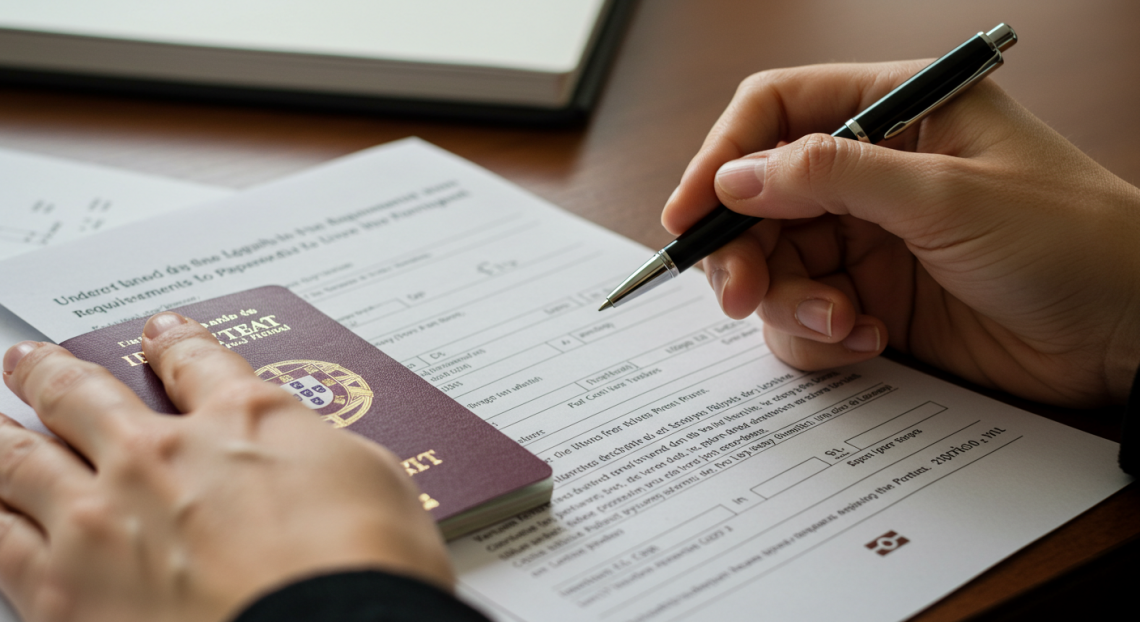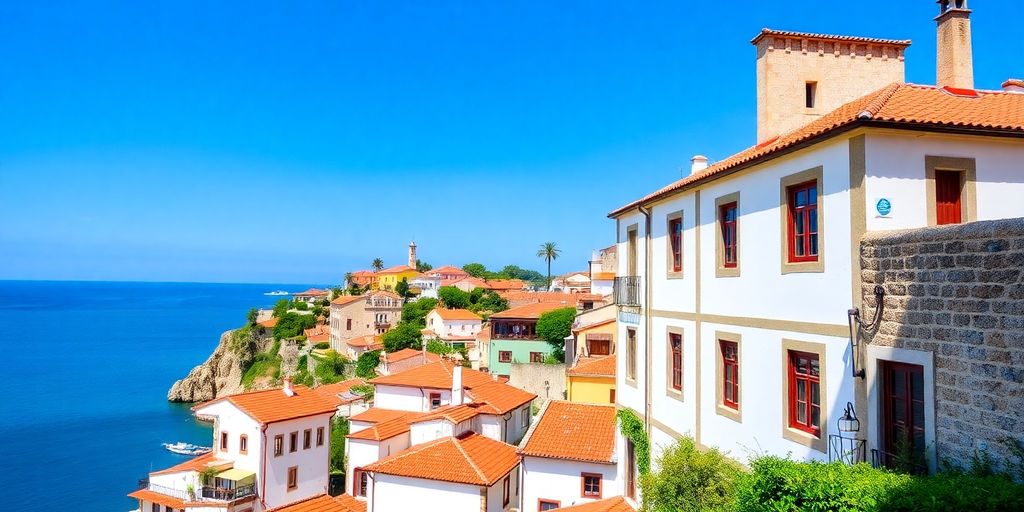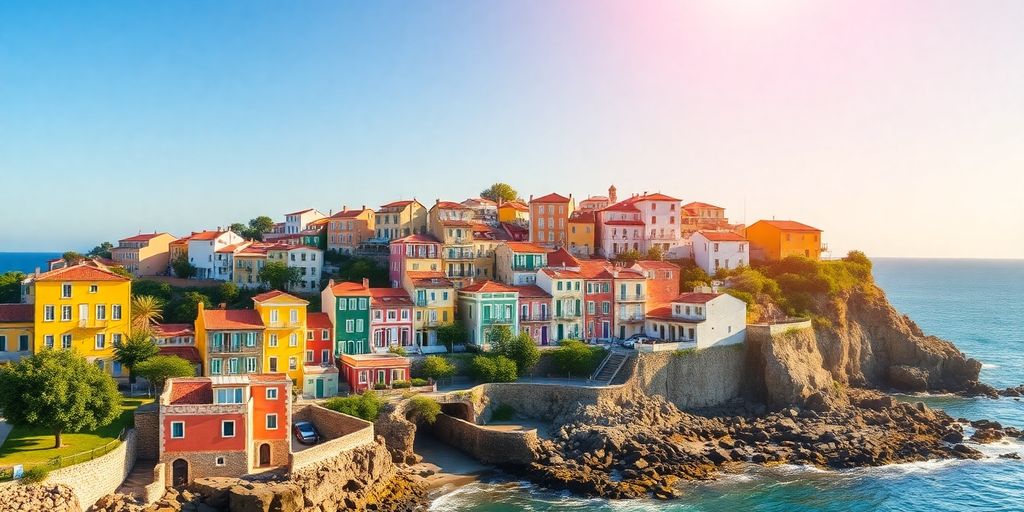
Understanding the Legal Requirements and Paperwork To Live in Portugal in 2025
Thinking about making Portugal your home in 2025? You’re not alone. This charming country with its sunny weather and rich culture is a popular spot for many. But before you pack your bags, there’s some important stuff you need to know. From visas to citizenship, Portugal has its own set of rules and paperwork. Let’s break it down so you can get a clear picture of what it takes to live there legally.
Key Takeaways
- Portugal offers various visas and residency options, each with unique requirements.
- Understanding tax obligations in Portugal is crucial for financial planning.
- The Golden Visa program is a popular route for investors seeking residency.
- Recent changes in nationality laws may impact your citizenship plans.
- Language skills and cultural understanding can ease your integration into Portuguese life.
Navigating Portugal’s Residency Permit Process
Understanding Different Types of Visas
When you’re planning to live in Portugal, the first thing to explore is the variety of visas available. Portugal offers several visa types tailored to different needs, like the D7 Visa for retirees and those with passive income, and the D3 Visa for entrepreneurs and skilled professionals. Each visa has its own set of requirements, so it’s important to choose the one that best aligns with your situation. Understanding these options can significantly affect your ability to settle smoothly. Additionally, the Golden Visa program is a popular choice for investors looking to secure residency through real estate or capital investment. It’s vital to research and gather all necessary documentation to ensure a successful application process. By familiarizing yourself with the various visa options for exploring Portugal, you can make informed decisions that facilitate a seamless transition to your new life in this beautiful country.
Application Steps and Requirements
Applying for a residency permit in Portugal involves a series of steps that you need to follow carefully. Here’s a simplified breakdown:
- Gather Necessary Documents: This includes your passport, proof of income, and health insurance.
- Submit Your Application: You can do this through the Portuguese consulate in your home country or online.
- Attend an Interview: Be prepared to discuss your plans and intentions in Portugal.
The process requires patience and attention to detail. Missing a document or failing to meet a deadline can delay your application.
Common Challenges and Solutions
Moving to a new country comes with its own set of challenges. In Portugal, bureaucratic hurdles can be frustrating. Here are some common issues and how to tackle them: Navigating the paperwork for residency permits, health care registration, and setting up a bank account can feel overwhelming without proper guidance. It’s essential to familiarize yourself with the local processes and seek help from expat communities or legal advisors. Additionally, understanding the working conditions in Portugal is crucial, as they may differ significantly from what you’re used to. Taking the time to research labor laws and employee rights can greatly ease your transition and enhance your overall experience in the country.
- Language Barriers: Consider hiring a translator or taking Portuguese classes to help with paperwork.
- Complex Documentation: Make sure you double-check all documents for completeness and accuracy.
- Long Wait Times: Patience is key, but staying informed about your application’s status can ease anxiety.
By preparing for these challenges, you can make the residency process in Portugal a bit smoother. Remember, thorough preparation and a clear understanding of the requirements can make all the difference.
Key Legal Requirements for Living in Portugal
Residency Obligations and Compliance
When you decide to live in Portugal, understanding your residency obligations is crucial. Staying compliant with Portuguese laws involves a few key steps. First, you need to apply for a residency permit, which requires you to prove financial stability and health insurance coverage. Once you have your permit, you must spend at least 183 days per year in Portugal to maintain your residency status. Don’t forget to update your address with local authorities if you move within the country.
Taxation and Financial Responsibilities
Living in Portugal means you’ll have to navigate the Portuguese tax system. You’ll need a NIF number, which is your tax identification number, to handle most financial matters, including opening a bank account. As a resident, you are subject to Portuguese taxes on your worldwide income. However, Portugal offers the Non-Habitual Resident (NHR) scheme, which can provide tax benefits for your first ten years of residency. Make sure to file your taxes annually to avoid penalties.
Language and Cultural Integration
While it’s not mandatory to speak Portuguese, learning the language can significantly enhance your experience. It helps in everyday interactions and shows respect for the local culture. Many expats find that taking language classes or participating in community events helps them integrate more smoothly. Additionally, understanding cultural norms, such as the importance of family and local festivities, can help you feel more at home in Portugal.
For those considering permanent residency and Portuguese citizenship, it’s important to note that after five years of legal residence, you can apply for these statuses, which offer more stability and rights within the country.
Understanding Portugal’s Citizenship Pathways
Eligibility Criteria for Citizenship
To become a Portuguese citizen, you have several pathways to consider, each with its own set of eligibility requirements. One common route is through naturalization, which requires residing in Portugal for five years and demonstrating proficiency in the Portuguese language. If you’re married to a Portuguese citizen, you might be eligible after three years of marriage, with no residency requirement. For those with Portuguese ancestry, citizenship by descent is possible if you can prove your lineage, often needing documents like a marriage certificate to verify relationships. Additionally, Sephardic Jews with ancestral ties to Portugal can apply for citizenship, highlighting the country’s commitment to right historical wrongs.
Naturalization Process Overview
The naturalization process in Portugal begins with obtaining a temporary residence permit. After five years, you can apply for permanent residency, and eventually, citizenship. This pathway requires passing a language test to prove your proficiency in Portuguese. It’s essential to gather all necessary documents, such as proof of residency and language skills, to ensure a smooth application process. Hiring an immigration lawyer can help streamline this journey, especially if you’re unfamiliar with the legal intricacies involved.
Benefits of Portuguese Citizenship
Holding Portuguese citizenship comes with numerous perks. A Portuguese passport grants you visa-free access to many countries, including those in the Schengen Area, the UK, and the USA. This opens up a world of travel and employment opportunities, allowing you to work freely within the EU without additional permits. Furthermore, as a citizen, you can pass on your nationality to your children, ensuring they too can enjoy these benefits. The ability to live and work in a diverse and vibrant country like Portugal is a significant draw for many seeking citizenship.
The Role of the Golden Visa in Portugal’s Immigration
Investment Requirements and Options
The Golden Visa program in Portugal is a popular choice for those looking to gain residency through investment. Initially designed to attract international capital, it has evolved over the years. As of 2025, real estate investments are no longer an option due to the “Mais Habitação Law.” However, there are still several viable pathways:
- Capital Transfers: You can transfer a minimum of €1,500,000 to Portugal. This remains a key route for many investors.
- Job Creation: Creating ten full-time jobs in Portugal is another pathway that aligns with the country’s economic goals.
- Cultural and Artistic Support: Contributions towards cultural heritage or artistic productions are also accepted.
Application Process for the Golden Visa
Applying for the Golden Visa involves several steps. First, ensure you meet the eligibility criteria: being a non-EU national with a clean criminal record. Then, choose your investment route and gather necessary documentation, which includes proof of investment and legal compliance. The application is submitted to the Portuguese Immigration and Borders Service (SEF). After approval, you must maintain your investment for at least five years. It is crucial to keep track of your visa application procedures, as any discrepancies or missing documents can lead to delays or rejections. Once your application is approved, you will receive your Golden Visa, which grants you the right to live, work, and travel within the Schengen Area. Remember to renew your residency status every two years by demonstrating your ongoing investment and compliance with the terms of the visa.
Advantages of the Golden Visa Program
The Golden Visa offers numerous benefits. One significant advantage is the ability to apply for permanent residency and even Portuguese citizenship after five years. This opens doors to European citizenship, offering freedom to live, work, and travel across the EU. Moreover, the program requires minimal stay requirements—just seven days per year in Portugal. This flexibility makes it appealing for global investors seeking a European base without the need to relocate fully.
Family Reunification and Residency in Portugal

Eligibility for Family Members
When you move to Portugal, you might want your family to join you. Family reunification is a key part of Portugal’s immigration policy. You can apply for your spouse, children under 18, and even adult children if they are financially dependent and in school. Parents of the main applicant can also be included if they are over 65.
Application Procedures for Dependents
Applying for family reunification is a straightforward process but requires attention to detail. You and your dependents will need to submit applications simultaneously. Make sure all documents like birth certificates and marriage licenses are ready. It’s smart to double-check everything to avoid delays.
Rights and Benefits for Families
Once your family is in Portugal, they enjoy many of the same benefits as you do. This includes access to healthcare and education. Your spouse can work, and your kids can go to school. It’s important to note that while they have these rights, they also share your responsibilities, like following the laws and regulations of Portugal.
Recent Changes in Portugal’s Nationality Law
Impact on Residency and Citizenship Applications
In 2024, Portugal made significant changes to its nationality law, impacting how residency and citizenship applications are processed. One of the most important changes is that the five-year residency period required for citizenship now starts from the date you apply for a residency permit, not from when the permit is granted. This means you can potentially become eligible for citizenship sooner.
This adjustment is especially beneficial for those applying through investment routes like the Golden Visa, as it reduces the waiting time before you can apply for citizenship. The change provides a clearer timeline, allowing you to plan your naturalization process more effectively.
New Requirements for Sephardic Citizenship
For those seeking Sephardic citizenship, a notable update requires applicants to reside in Portugal for at least three years. Previously, demonstrating descent was sufficient, but now you must also show a tangible connection to the country by living there. This shift emphasizes the importance of establishing a genuine link to Portugal beyond ancestral ties.
Streamlining of Application Processes
Portugal has also streamlined the process for recognizing paternity, which can be crucial for those claiming citizenship through Portuguese heritage. If paternity is acknowledged by a court, you can now bypass lengthy legal procedures that were once necessary. Just be aware, there’s a three-year window from the court’s acknowledgment to act on this opportunity.
These changes aim to simplify and expedite the path to citizenship, making it more accessible for those with legitimate claims. Overall, the updates reflect Portugal’s commitment to maintaining a fair and efficient immigration system.
Exploring Non-Habitual Resident Status in Portugal

Benefits of Non-Habitual Residency
The Non-Habitual Resident (NHR) status in Portugal is a popular choice for those looking to benefit from a favorable tax regime. This status offers a 10-year tax break on foreign income, which can be a huge draw for retirees and professionals alike. Here’s what you get:
- Reduced tax rates on certain Portuguese income.
- Tax exemptions on pensions and some foreign income.
- No wealth tax, making it easier to manage assets.
Application Process and Requirements
Applying for NHR status involves a few steps, but it’s pretty straightforward once you know what to do. Here’s a quick rundown:
- Register as a tax resident in Portugal by spending more than 183 days a year in the country or having a permanent home here.
- Complete the application form on the Portuguese tax office’s website.
- Submit all necessary documents, including proof of residence and a clean tax history.
Tax Implications for Non-Habitual Residents
Understanding the tax implications is crucial when considering NHR status. While you enjoy benefits, you must also comply with specific tax rules:
- You’ll need to declare your global income.
- Some professions, like architects and engineers, can enjoy a flat tax rate of 20% on Portuguese income.
- Keep in mind, the tax benefits are time-limited, so planning ahead is key.
Overall, the NHR status is a fantastic option if you’re looking to enjoy Portugal’s sunny climate and vibrant culture while benefiting from attractive tax conditions.
Common Challenges in the Portuguese Immigration Process

Navigating Bureaucratic Hurdles
When you’re trying to settle in Portugal, the bureaucratic maze can be overwhelming. Dealing with paperwork and official procedures is often a test of patience. To make things smoother, consider hiring an immigration lawyer who knows the ropes. They can help you with the documentation and ensure everything’s in order. But remember, even with help, delays are common, especially if you’re applying for residency or citizenship.
Ensuring Compliance with Legal Requirements
Staying compliant with Portugal’s legal requirements is another hurdle. You need to keep track of various obligations like maintaining a clean criminal record and proving your integration into Portuguese society. Proving integration might involve showing language proficiency or participating in community activities. It’s crucial to stay updated on any changes in the law, as these can affect your residency status.
Overcoming Language Barriers
Language can be a significant barrier when you’re dealing with official matters in Portugal. While many people speak English, official documents and procedures are often in Portuguese. It might be helpful to take a language course or hire a translator for important meetings. This not only helps in understanding the process better but also shows your commitment to integrating into the local culture.
Understanding these challenges and preparing for them can make your transition to life in Portugal a bit easier. And as the influx of immigrants continues to grow, integrating into Portuguese society will become even more important.
Conclusion
So, there you have it. Moving to Portugal in 2025 means getting familiar with a bunch of legal stuff and paperwork. It’s not just about packing your bags and hopping on a plane. You gotta know the rules, like how long you need to stay before you can apply for citizenship, or what documents you need to keep handy. Sure, it might seem like a lot at first, but once you get the hang of it, it’s pretty straightforward. Plus, living in Portugal? Totally worth it. With its sunny weather and laid-back lifestyle, you’ll soon see why so many people are making the move. Just remember, take it one step at a time, and don’t hesitate to ask for help if you need it. Good luck on your new adventure! You’ll also want to look into how to find a job in Portugal, as securing employment can greatly enhance your experience and integration into the local community. Networking and knowing where to search for opportunities can give you a significant advantage, so consider utilizing online platforms or local job fairs. With a bit of patience and persistence, you’ll not only navigate the bureaucracy but also thrive in your new life under the Portuguese sun!
Frequently Asked Questions
What types of visas are available for moving to Portugal?
Portugal offers several visa types, including the Golden Visa for investors, the D7 Visa for retirees and those with passive income, and work visas for employment seekers.
How can I apply for a residency permit in Portugal?
To apply for a residency permit, you’ll need to gather necessary documents like proof of income, health insurance, and a clean criminal record, then submit your application to the local Portuguese consulate or embassy.
What are the main legal requirements for living in Portugal?
Key requirements include maintaining legal residency status, complying with tax obligations, and integrating into the local culture, which may involve learning Portuguese.
How does the Golden Visa program work?
The Golden Visa program allows non-EU citizens to obtain residency by investing in Portuguese real estate or businesses. It offers a pathway to citizenship after five years.
What is the process for family reunification in Portugal?
Family members of residents can apply for reunification, usually requiring proof of relationship and financial support. This allows spouses, children, and sometimes parents to join the primary resident.
What recent changes have been made to Portugal’s nationality laws?
Recent updates include changes to the residency requirement for citizenship, now starting from the date of residency application, and new rules for Sephardic Jewish descendants.



